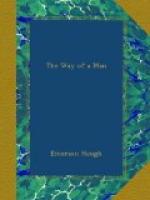It was not until the twentieth of July that our leaders determined upon a flanking movement to our right, which was to cross Bull Run at the Sudley Ford. Even so, we dallied along until every one knew our plans. Back of us, the battle opened on the following day, a regiment at a time, with no concert, no plan. My men were with this right wing, which made the turning movement, but four brigades in all. Four other brigades, those of Howard, Burnside, Keyes and Schenck, were lost somewhere to the rear of us. Finally, we crossed and reached the left flank of the Confederates under Beauregard, and swung south along Bull Run. Our attack was scattering and ill-planned, but by three o’clock of the next day we were in the thickest of the fighting around the slopes which led up to the Henry House, back of which lay the Confederate headquarters.
I saw the batteries of Rickett and Griffin of our Regulars advance and take this height against the steadily thickening line of the Confederates, who had now had full time to concentrate. There came a hot cavalry charge upon the Zouave regiment on my left, and I saw the Zouaves lie down in the woods and melt the line of that charge with their fire, and save the battery for a time. Then in turn I saw that blunder by which the battery commander allowed Cummings’ men—the Thirty-third Virginia, I think it was—deliberately to march within stone’s throw of them, mistaken for Federal troops. I saw them pour a volley at short range into the guns, which wiped out their handlers, and let through the charging lines now converging rapidly upon us. Then, though it was but my first battle, I knew that our movement must fail, that our extended line, lying upon nothing, supported by nothing, must roll back in retreat along a trough road, where the horses and guns would mow us down.
Stuart’s men came on, riding through us as we broke and scattered. Wheat’s Louisiana Tigers came through our remnants as well. We had no support. We did not know that back of the hill the Confederate recruits were breaking badly as ourselves, and running to the rear. We were all new in war. We of the invading forces caught the full terror of that awful panic which the next day set the North in mourning, and the South aflame with a red exultation.
All around us our lines wavered, turned and fled. But to some, who knew the danger of the country back of us, it seemed safer to stay than to run. To that fact I owe my life, and at least a little satisfaction that some of us Virginians held our line for a time, even against those other Virginians who came on at us.
We were scattered in a thin line in cover of heavy timber, and when the pursuit came over us we killed a score of their men after they had passed. Such was the confusion and the madness of the pursuit, that they rolled beyond our broken line like a wave, scarce knowing we were there. Why I escaped I do not know, for I was now easily visible, mounted on a horse which I had caught as it came through the wood riderless. I was passing along our little front, up and down, as best I could in the tangle.




